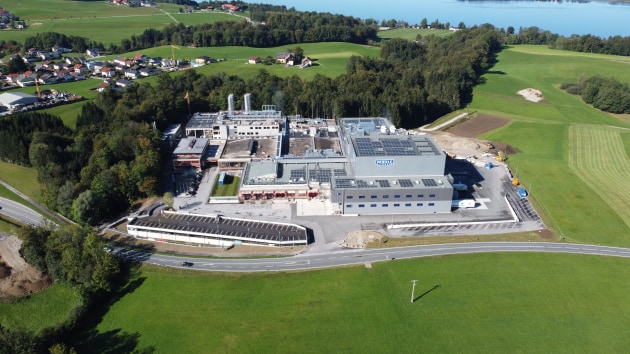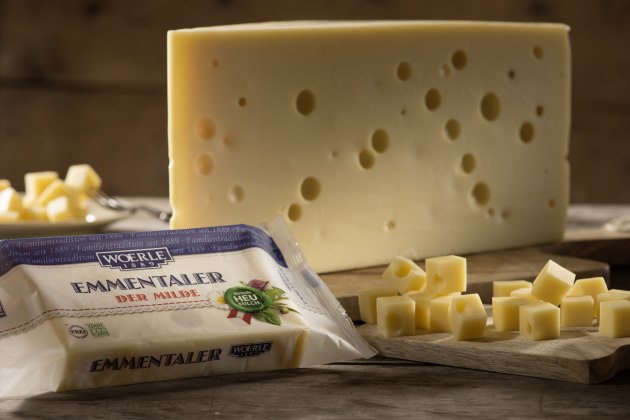Here to stay – this is the motto of Austrian cheese manufacturer Woerle, and its information technology backs up this aim. Woerle promotes digitisation, and the automatic high-bay storage facility as well as the RFID systems in use stand for the modernization of the company. In the end, everything should be highly interconnected - and controlled by the ERP system.
As a cheese manufacturer, Woerle is hugely successful in two markets: selling its hay milk products in Austria, and supplying processed cheese in international markets. The global player exports 51 per cent of its annual output of 28,500 tonnes to 70 countries around the world. Behind all this is more than just a smart strategy. Woerle has also opted for cutting-edge technologies, including RFID chips for the trolleys in processed cheese production. The central management unit is their ERP system.
“Our ERP enables us to serve the national premium market as well as the global market. We are capable of producing small batches subject to stringent quality requirements with the same level of efficiency as large volumes for the international business,” says Manfred Hager, head of controlling & organisation.
Farmer payment directly in the ERP system
Like in other European countries, the Austrian milk market is strongly regulated. This begins with the payment of the farm-gate milk price, which depends on the quality features of the supplied milk, on the milk’s fat and protein content, and on the bacteriological properties such as the plate count. For the calculation of the milk price, Woerle uses the “Milk Payment” module integrated into the ERP system.

This program analyses the data from the milk trucks as well as the lab values and automatically determines the correct price. Any markups or reductions are calculated in line with quantity and quality ranges. The statement of return deliveries is also performed automatically by the software. The key benefit for Woerle: all specific data is processed in a single system, ensuring a consistent information flow up to Financial Accounting.
All warehouses represented in the ERP
From Henndorf to the world: with a new building, Woerle has laid the technological foundation for its international expansion. In 2019, Woerle concentrated its formerly distributed cheese factories at one site. On the one hand, to utilize the efficiency gains from centralized processes, and on the other hand, to reduce its CO2 footprint: since autumn 2019, they have been able to cut about 5,000 truck tours between the different warehouses and the headquarters.
The fully automatic high-bay storage facility with two temperature zones has been an important part of the large-scale project. This is where the company stores pallets with raw cheese products, semi-finished products from its own production, finished products, and retail goods.
Via the procurement process, the raw materials for cheese and processed cheese go into the high-bay warehouse, where an upstream QA test in receiving makes sure that the CSB-System knows the qualities of all incoming raw materials.
The key parameters such as lot number and minimum sell-by date as well as features like the fat content of the dry matter or results of the visual inspection are entered in the system. This integration of quality management allows in-process testing throughout the entire supply chain, from reception and storage to the shipment of the finished products.
With the integration of the high-bay storage facility, now all warehouses are represented in the ERP.
“In our company, all employees see the same inventory accounts, whether raw materials, finished products, purchased items, or packaging materials. This makes it much easier for us to retrieve stock information.”
The user interfaces at the workstations for stock putaway and stock removal are supplied by CSB too. “It was important to us that all users work with CSB. It's a lot easier if all employees are working in the same world,” says Hager.
RFID for enhanced production security and accurate traceability
One of the fundamental challenges in processed cheese production is the traceability of the final products. Every batch consists of various raw cheese products, partly originating from the in-house production, while some parts are purchased from other cheese manufacturers.

In melting, these different raw materials are combined - and have to be quickly identifiable by the ERP system in the case of an incident.
This task will soon be aided by RFID chips. Every trolley will then be labeled with a chip, which is registered at the scale with a hand-held scanner during component preparation. At batch processing, the chip is verified automatically by the software. As a result, the previously weighed cheese raw materials, which are identified by the RFID code on the vats, can be allocated to the correct batch according to the plans.
The aim is to make inventory management more transparent, to enhance production security and control, and to reduce the losses. What is more, the RFID chips smoothly communicate with the CSB-System, ensuring reliable information processing without manual rework.
Mobile information processing to increasing picking speeds
Reducing manual data capture to improve data accuracy - a goal that Woerle has also achieved in picking. Here, the staff carries the ERP system along in the form of handheld devices.
The pickers using this “Mobile ERP” solution no longer need to work with picking notes, as the order data is sent directly to their handhelds for processing. The advantages of mobile data capture and processing are obvious.
Paperless processes make the employees more productive, the error rate is substantially reduced, and the data quality as well as the data availability is improved as there are no media disruptions. Supply of the picking zone is also managed by the CSB-System that initiates automatic stock removals from the high-bay storage facility.
Dispatch management is handled via the picking control station by CSB. Full pallets and partial pallets are separated. For full pallets, the stock removal order is transmitted directly to the high-bay storage facility.
The partial pallets coming from picking are returned to the high-bay warehouse, from where they are taken out together with the full pallets of the order or route, and moved to staging tracks for loading.During stock removal, customer-specific labels are attached to the pallets.
Great progress in the digitised cheese production
Woerle has demonstrated how the ERP system has enabled the end-to-end digitization in the entire company. The system links all processes, from the purchase order to dispatch, and provides the executive management with the transparency they need in their day-to-day operations.
The integration of the internal logistics is already well advanced. “We have made great progress on our way towards the digitized cheese production,” says Hager.
Yet, this is not all. Additional projects are soon to be implemented, and the family business – now into its fifth generation – is eager to get started: 35-year old Gerrit Woerle will take over as a CEO from his father, Gerhard.
In fact, Woerle is here to stay.
For further case studies from CSB-System, visit the website, YouTube or LinkedIn.






